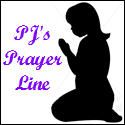
Good Afternoon to All!
My study today came about through a discussion we had in a community in Blog Frog to which I belong . The question was asked "do you think women talk too much?" This person elaborated and said it originally came from the Biblical context as it is written in 1 Timothy 2:12. The thing is, it was taken completely out of context. It seems to me if He wanted us to remain silent, He would not have given us vocal cords. This person made it sound like we were to remain silent, which is not at all what the scripture says. They sound like my hubby when he is "TRYING"to be funny.
His favorite jab is women are to be under subjection to their husbands. Another idea taken out of context, because this is not a general statement. This is to be honored only if he is in the will of God in whatever he is telling her to do. In other words if he wants his wife to do something that she knows is against the teachings of God, then she is not to do it.
Anyway, when I read this particular discussion, it made me want to go further and read the whole reference to this passage.
What people do not realize is that taking a scripture here and there can be dangerous. It can make the scripture take on a whole new meaning Contrary to what was originally said and meant.
The following text was taken from the New King James Bible Reference Section.
1 Timothy 2:11 Let a woman learn is a command. Paul ignored popular myths about women being incapable of learning and urged Timothy to provide opportunities for women to be educated. In silence refers to the woman's attitude or manner while learning, as should be true of all believers. Paul was not saying that a woman could not speak in the local assembly (see 1. Cor. 11:2-16).
He was simply cautioning women to learn with an attitude of all submission and not in an unruly manner. (2:12) To teach: Paul uses a Greek word that indicates the typing of teaching that was found in the Jewish communities and synagogues from which he had come. such teaching was built on the revelation of God and assumed that there would be some sort of oversight, like that exercised in the early church by the elders (see 5:11, 4:16--5:2, 2 Tim. 3:17; 5:1-4; Titus 2:5, 2:8-11).
Generally those who exercised this responsibility in the early church had the spiritual gift of teaching (see Romans. 12:7, 1 Cor. 12:28), but not every gift of teaching (by men or women) was necessarily to be exercised over the entire congregation. The word "or" seems to indicated that teach is defined by the phrase "have authority over a man". It seems best to understand this passage as teaching that women may exercise their spiritual gifts in a variety of ministries in a local assembly (see 2 Tim. 3:14, Titus 2:3, 4), as long as those gifts are exercised under the appropriate leadership of men. Other commentators have viewed this verse as an example of Paul using his apostolic authority to curb the spread in Ephesus of false teaching (see 1:3-7) that apparently was becoming popular among some women who had not been properly instructed.(see v. 11).
There are several verses written such as 1 Corinthians 14:34 which says "let your women keep silent in the churches, for they are not permitted to speak; but they are to be submissive, as the law also says. The Reference to this verse explains that Paul's command here is the subject of much debate because it seems to contradict the fact that Paul spoke of women prophesying in 11:5. It has been suggested that Paul was addressing a particular problem in the Corinthian church where a group of women were being disruptive.
I guess what I am trying to say is that before we go off trying to "spout scriptures" and telling others what this means or that means, we need to do research into the references. This has definitely shed some light into my way of thinking in this particular scripture. I learned much that I didn't know.
Also, just because it says "women are to be silent" in a specific scripture, we need to look at the context, WHO he is saying it to and WHY he is saying it. It kind of reminds me of when I'm talking on the phone, and my husband is trying to talk to me. I shush
I know this may be a lot of scriptures, and a lot of reading, but I would rather cover the subject than take bits and pieces and risk misconstruing the meaning.
All in all, it is not that we as women are to be silent, nor did it mean that "back then. It was saying that we were to have "overseers" when we taught, (kind of reminding me of apprenticeship)with men watching over us because they are to be the spiritual head of the household.
All of this being said, look at the major roles that women had. Deborah who was a judge, Esther who was a Queen, Ruth, Naomi, and many, many more. You can bet while they showed respect and submission to their husbands, they were allowed to gently put in their two cents.
The Answers to the Bible Challenge "Food and Drink Part 3 are as follows:
1. c) onions and garlic (Numbers 11:5)
2. d) loaves of bread/fig cakes (1 Samuel 25:18)
3. d) veal and unleavened bread (1 Samuel 28:21-25)
4. a) Solomon (2 Kings 10:21)
5. b) empty jars (2 Kings 4:1-7)
6. c) added meal (2 Kings 4:40-41)
7. a) wipe Jerusalem as a man wipeth a dish (2 Kings 21:13)
8. b) he had plenty of everything (Job 29:1-6)
9. c) apples (Song of Solomon 2:5)
10. b) Hosea (Hosea 7:8)
Have a great evening and May God Bless,

















2 comments:
You always have so much insight! I have spent a lot of time meditating, cross-referencing, and researching the Scriptures you posted, because of how controversial they can be! Without context, the verses lose so much meaning and can really taint God's character. Thanks for sharing all of this with us!
Thank you, Patti for sending your food for thoughts to the world!!
You are a super friend, Patti.
God bless you always!!
Love in Christ,
Poet Starry Dawn.
Post a Comment